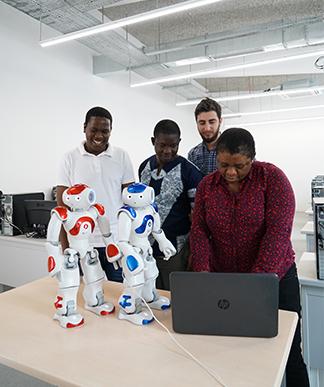


About the Department
In recent years, developments in science and technology have gained an incredible momentum. Once technological progresses increase, both the quality and the amount of data that must be processed increases also. Information systems that are used to access, process, evaluate, and transform information, has become one of the significant constituents of an advanced society. Information systems can be used in numerous structures, such as game consoles, large databases of financial institutions, communication systems or satellite communications in telecommunications companies, Internet service providers, and social networks. Experts which have the skills to design, develop, or manage information systems, may easily be chosen among information systems engineering graduates.
Education Opportunities
As in other engineering fields, Information Systems Engineering students complete core mathematics and science courses in the first two years. At the same time, they take subject matter courses, such as introduction to programming, algorithms, fundamentals of information systems, logic design, circuit analysis, computer architecture, visual programming, data structures, and introduction to Internet programming. In addition to these, they take courses such as introduction to business, engineering management, and engineering economy in order to have a general perspective and knowledge in the business and management fields. In the third year; operating systems, object-oriented programming, databases, computer networks, information security, project management, management information systems, information systems analysis and design, and business intelligence courses are offered for the students. Therefore, through this multi-dimensional course structure, students complete their program with an excellent background. Students can also take elective courses from the Department of Computer Engineering and Business School to develop their knowledge in different disciplines. Our program is a member of the Oracle Academy and Microsoft Imagine Academy.

Accreditations
Management Information Systems Program has been accredited for 5 years (2023) as of 17th September 2018 by the Germany-based Foundation for International Business Administration Accreditation (FIBAA), which inspects economics and management programs, including law and social sciences.
Career Areas
One of the main purposes of the department is to offer the highest level of knowledge and experience to the students, so that they can equip themselves to find positions at private or public institutions as experts, designers, or developers of information systems. After completing the program, students can work in software, banking, finance and manufacturing firms, marketing, electronic commerce companies, or in telecommunication sector. Furthermore, they can work in promising sectors such as computer games, mobile applications or cloud computing. Our graduates can also continue their academic studies. The interdisciplinary nature of the education given in the department increases post-graduate study opportunities for graduates at prestigious universities all over the world.
Contact
Faculty of Engineering
Science and Technology Center, ST226
Tel: +90 392 671 1111 Extension: 2401
Faculty E-mail: secretary-fe@ciu.edu.tr
Head of Department: Asst. Prof. Dr. Devrim SERAL
Head of Department E-mail: dseral@ciu.edu.tr
Compulsory Courses
First Semester
INTRODUCTION TO PROGRAMMING
Course code
CMPE111Credit
4Theoretical
3Practical
2Ects
6READING AND WRITING SKILLS-I
Course code
ENGL141Credit
3Theoretical
2Practical
2Ects
4INTRODUCTION TO INFORMATION SYSTEMS ENGINEERING
Course code
ISYE100Credit
0Theoretical
1Practical
0Ects
1CALCULUS-I
Course code
MATH101Credit
3Theoretical
3Practical
1Ects
6LINEAR ALGEBRA
Course code
MATH121Credit
2Theoretical
2Practical
0Ects
4GENERAL PHYSICS-I
Course code
PHYS101Credit
4Theoretical
3Practical
2Ects
6TURKISH LANGUAGE
Course code
TREG100Credit
0Theoretical
2Practical
0Ects
2TURKISH
Course code
TURK100Credit
0Theoretical
2Practical
0Ects
2Second Semester
ALGORITHMS AND PROGRAMMING
Course code
CMPE124Credit
4Theoretical
3Practical
2Ects
6READING AND WRITING SKILLS-II
Course code
ENGL142Credit
3Theoretical
2Practical
2Ects
4FOUNDATIONS OF INFORMATION SYSTEMS
Course code
ISYE102Credit
3Theoretical
3Practical
0Ects
4CALCULUS-II
Course code
MATH102Credit
3Theoretical
3Practical
1Ects
6DISCRETE MATHEMATICS
Course code
MATH122Credit
3Theoretical
3Practical
1Ects
5GENERAL PHYSICS-II
Course code
PHYS102Credit
4Theoretical
3Practical
2Ects
6Third Semester
INTRODUCTION TO BUSINESS-I
Course code
BUSN101Credit
3Theoretical
3Practical
0Ects
6DIGITAL LOGIC DESIGN
Course code
CMPE221Credit
4Theoretical
3Practical
2Ects
7HISTORY OF CIVILIZATION
Course code
HIST100Credit
0Theoretical
2Practical
0Ects
2INTERNET PROGRAMMING
Course code
ISYE233Credit
3Theoretical
3Practical
0Ects
5MANAGEMENT INFORMATION SYSTEMS
Course code
ISYE263Credit
3Theoretical
3Practical
0Ects
4INTRODUCTION TO PROBABILITY AND STATISTICS
Course code
MATH205Credit
4Theoretical
4Practical
1Ects
6MODERN TURKISH HISTORY
Course code
TARH100Credit
0Theoretical
2Practical
0Ects
2Fourth Semester
FREE ELECTIVE
Course code
FREEXX1Credit
3Theoretical
3Practical
0Ects
7VISUAL PROGRAMMING
Course code
ISYE214Credit
3Theoretical
2Practical
2Ects
6COMPUTER ARCHITECTURE AND ORGANIZATION
Course code
ISYE226Credit
4Theoretical
3Practical
2Ects
6DATA STRUCTURES AND DATA ORGANIZATION
Course code
ISYE242Credit
4Theoretical
3Practical
2Ects
6INFORMATION SYSTEMS ANALYSIS AND DESIGN
Course code
ISYE272Credit
3Theoretical
3Practical
1Ects
5Fifth Semester
FREE ELECTIVE
Course code
FREEXX2Credit
3Theoretical
3Practical
0Ects
7OBJECT ORIENTED PROGRAMMING
Course code
ISYE313Credit
4Theoretical
3Practical
2Ects
6DATABASE MANAGEMENT SYSTEMS AND PROGRAMMING-I
Course code
ISYE343Credit
4Theoretical
3Practical
2Ects
5OPERATING SYSTEMS
Course code
ISYE351Credit
4Theoretical
3Practical
2Ects
6AREA ELECTIVE
Course code
ISYEXX1Credit
3Theoretical
3Practical
0Ects
6Sixth Semester
SOFTWARE ENGINEERING
Course code
CMPE314Credit
4Theoretical
3Practical
2Ects
6FREE ELECTIVE
Course code
FREEXX3Credit
3Theoretical
3Practical
0Ects
7FUNDAMENTALS OF COMPUTER NETWORKS
Course code
ISYE332Credit
4Theoretical
3Practical
2Ects
6AREA ELECTIVE
Course code
ISYEXX2Credit
3Theoretical
3Practical
0Ects
6UNIVERSITY ELECTIVE
Course code
UNIEXX1Credit
3Theoretical
3Practical
0Ects
5Seventh Semester
PROJECT MANAGEMENT
Course code
ENGI401Credit
3Theoretical
3Practical
0Ects
5FREE ELECTIVE
Course code
FREEXX4Credit
4Theoretical
3Practical
2Ects
7SUMMER TRAINING
Course code
ISYE300Credit
0Theoretical
0Practical
0Ects
5ADVANCED INTERNET PROGRAMMING
Course code
ISYE483Credit
3Theoretical
3Practical
0Ects
4AREA ELECTIVE
Course code
ISYEXX3Credit
3Theoretical
3Practical
0Ects
6UNIVERSITY ELECTIVE
Course code
UNIEXX2Credit
3Theoretical
3Practical
0Ects
5Eighth Semester
CAPSTONE PROJECT
Course code
ENGI402Credit
4Theoretical
2Practical
4Ects
8ENGINEERING ECONOMY
Course code
INDE232Credit
3Theoretical
3Practical
0Ects
4ENGINEERING MANAGEMENT
Course code
ISYE482Credit
3Theoretical
3Practical
0Ects
4AREA ELECTIVE
Course code
ISYEXX4Credit
3Theoretical
3Practical
0Ects
6AREA ELECTIVE
Course code
ISYEXX5Credit
3Theoretical
3Practical
0Ects
6Elective Courses
ADVANCED INTERNET PROGRAMMING
Course code
ISYE483Credit
3Theoretical
3Practical
0Ects
6SOFTWARE ENGINEERING
Course code
CMPE314Credit
4Theoretical
3Practical
2Ects
7MOBILE APPLICATION DEVELOPMENT
Course code
CMPE425Credit
3Theoretical
3Practical
0Ects
CIRCUIT THEORY I
Course code
EELE211Credit
4Theoretical
3Practical
2Ects
6ALGORITHMS AND PROGRAMMING
Course code
ISYE223Credit
4Theoretical
3Practical
2Ects
6ETHICS
Course code
INDE335Credit
3Theoretical
3Practical
0Ects
4CLOUD COMPUTING
Course code
ISYE481Credit
3Theoretical
3Practical
0Ects
MODERN PROGRAMMING PLATFORMS
Course code
CMPE442Credit
3Theoretical
3Practical
0Ects
PROGRAMMING IN MATLAB FOR ENGINEERING
Course code
ENGI316Credit
3Theoretical
3Practical
0Ects
INFORMATION SECURITY AND ASSURANCE
Course code
ISYE371Credit
3Theoretical
3Practical
0Ects
6COMPUTER SIMULATION
Course code
CMPE485Credit
3Theoretical
3Practical
0Ects
INTRODUCTION TO BIOMETRIC SYSTEMS
Course code
CMPE466Credit
3Theoretical
3Practical
0Ects
SIGNAL AND IMAGE PROCESSING
Course code
CMPE326Credit
3Theoretical
3Practical
1Ects
6COMPUTER NETWORK DESIGN AND APPLICATIONS
Course code
ISYE431Credit
3Theoretical
2Practical
2Ects
7EMBEDDED SYSTEMS
Course code
CMPE455Credit
3Theoretical
3Practical
0Ects
5INTRODUCTION TO CRYPTOGRAPHY AND NETWORK SECURITY
Course code
CMPE336Credit
3Theoretical
3Practical
0Ects
ROBOTICS
Course code
EELE411Credit
3Theoretical
3Practical
1Ects
5INFORMATION SYSTEMS ANALYSIS AND DESIGN
Course code
ISYE272Credit
3Theoretical
3Practical
1Ects
5COMPUTER AIDED DATA ANALYSIS
Course code
INDE491Credit
3Theoretical
3Practical
0Ects
INTERNET PROGRAMMING
Course code
ISYE233Credit
3Theoretical
3Practical
0Ects
4IOT FOR ENGINEERING
Course code
ENGI416Credit
3Theoretical
2Practical
2Ects
5TOTAL QUALITY MANAGEMENT
Course code
INDE428Credit
3Theoretical
3Practical
0Ects
SUPPLY CHAIN AND LOGISTICS MANAGEMENT
Course code
INDE461Credit
3Theoretical
3Practical
0Ects
0HAZARDOUS AND SPECIAL WASTE MANAGEMENT
Course code
ENVE431Credit
3Theoretical
3Practical
0Ects
5CLOUD COMPUTING
Course code
CMPE481Credit
3Theoretical
3Practical
0Ects
IMAGE, VIDEO AND SPEECH CODING
Course code
EELE468Credit
3Theoretical
3Practical
0Ects
DESKTOP APPLICATION DEVELOPMENT
Course code
CMPE424Credit
3Theoretical
3Practical
0Ects
ENVIRONMENTAL MANAGEMENT
Course code
ENVE407Credit
3Theoretical
3Practical
0Ects
5COMPUTER AIDED DESIGN
Course code
MCLE475Credit
3Theoretical
2Practical
3Ects
6SOIL AND GRD.WATER POLLUTION
Course code
ENVE427Credit
3Theoretical
3Practical
0Ects
TR Applicants
TR Students who are successful in the exams conducted by the Higher Education Council Student Selection and Placement Center (ÖSYM) and are entitled to enroll in our university in line with their preferences can complete the registration process with the necessary documents for registration from our Registration and Liaison Offices throughout Turkey or from the Marketing Directorate on campus.
Click for detailed admission requirements information.
TRNC Applicants
TRNC citizens and TR citizen candidate students who have completed their entire high school education in TRNC. They are placed in undergraduate programs in line with their success in the CIU Student Placement and Scholarship Ranking Exam and the programs they prefer.
Students who are successful in the exam can register from the TRNC Marketing Office.
Applicants can directly apply online to our undergraduate programs using the application portal. Please fill in your details correctly and upload all the required documents listed on the last page of the application form.
Required documents;
- Completed application form,
- Higher/Secondary Certificate or equivalents (e.g. O/A’Level, WAEC/NECO),
- Evidence of English Language competence: TOEFL (65 IBT) or IELTS (5.5). Students without these documents will take the CIU English proficiency exam on campus following arrival,
- Scanned copy of international passport/birth certificate,
- Fully completed and signed CIU Rules and Regulations document (which can be downloaded during the online application).
Cyprus International University provides academic scholarships for its students as an incentive for success, with most students benefiting from 50%, 75% or 100% scholarships or discounted tuition fees. Click for more information.
Tuition Fees are determined at the beginning of each academic year. Candidate students who are entitled to enroll in CIU can learn their fees in line with the Tuition Fee Calculation system.